Introduction
In the competitive landscape of modern business, the choice between custom workwear and off-the-shelf options is more than just a matter of preference; it’s a strategic decision that can shape a company's identity and enhance employee satisfaction. Custom workwear not only caters to the unique needs of a team but also serves as a powerful branding tool that fosters a sense of belonging and pride among employees.
As organizations navigate the complexities of workplace dynamics, understanding the benefits of tailored apparel—ranging from improved comfort and safety to increased morale and brand recognition—becomes essential.
This exploration delves into the key considerations for selecting the right workwear, the role of customization in enhancing brand identity, and the growing importance of sustainability in this space, all while highlighting the significant impact these choices have on both employee engagement and overall business success.
Custom Workwear vs. Off-the-Shelf: Making the Right Choice
When it comes to choosing between custom workwear and off-the-shelf options, it’s essential to consider your team’s specific needs and preferences. Custom workwear not only offers a tailored fit that accommodates individual body types but also provides unique branding opportunities through personalized designs on apparel such as t-shirts, hats, and bags. Additionally, customization extends beyond clothing to promotional items like pens, keychains, phone cases, and USB drives, allowing you to print logos and artwork that showcase your brand in full color.
This level of personalization can significantly enhance team morale and foster a sense of belonging within the workforce. Investing in custom workwear can lead to greater worker satisfaction, as it prioritizes comfort and safety, which are increasingly important in today’s work environment. In contrast, while off-the-shelf options may be more accessible and convenient, they often fall short in delivering the same degree of personalization and comfort that tailored solutions provide.
As you assess your options, consider factors such as:
- Cost
- Production turnaround time
- The potential effect on staff satisfaction
Remember, custom workwear now represents 75.0% of sales in the market for occupational apparel, and the Indian uniform and occupational apparel market has a potential CAGR of over 8%, indicating significant growth opportunities for custom workwear. This shift highlights the growing emphasis on employee well-being, making it all the more crucial to select clothing that resonates with your team’s identity and enhances their work experience.
It's important to note that while all clothing for work is a uniform, not all uniforms qualify as attire for work, emphasizing the need for thoughtful selection.
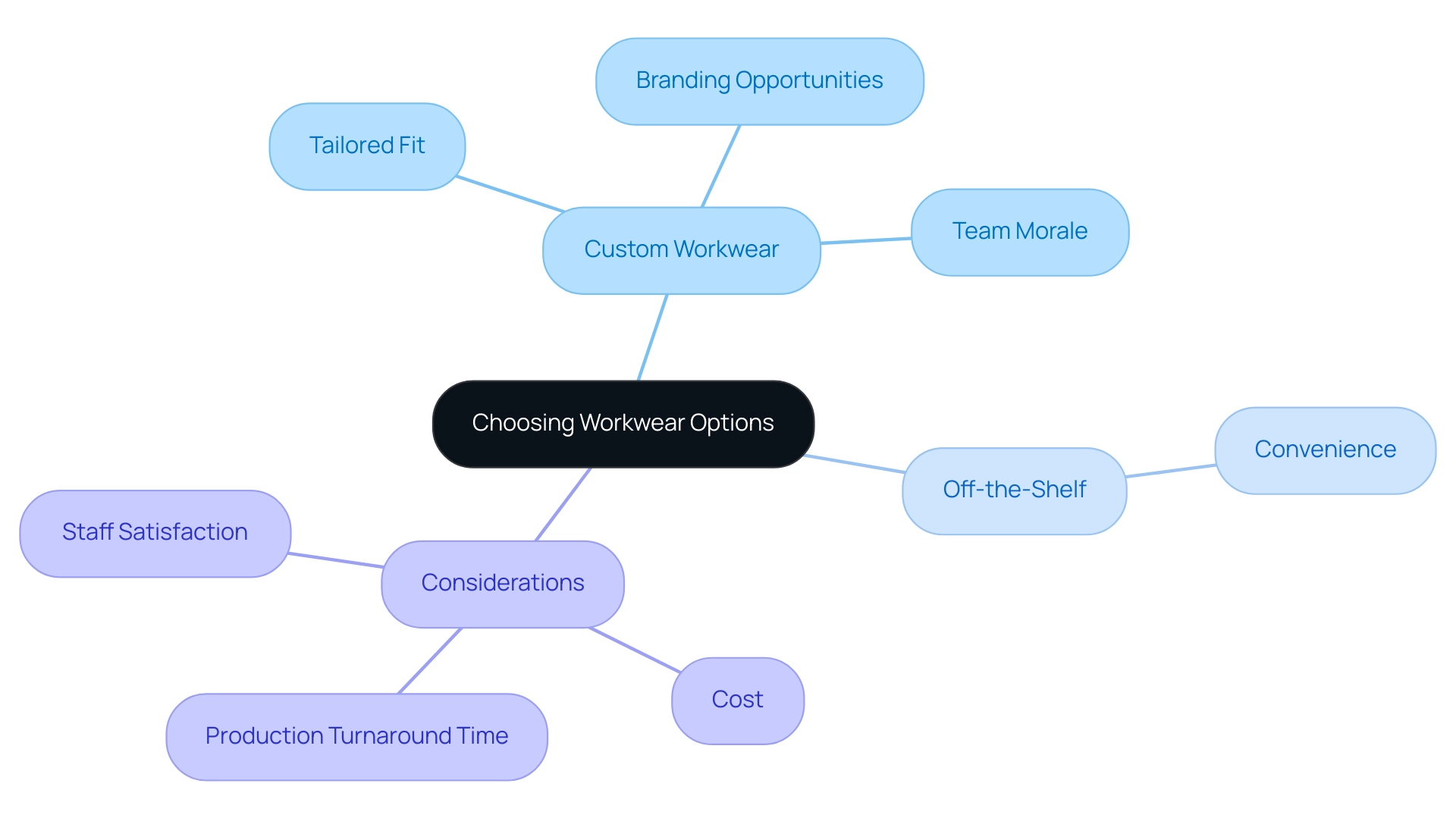
Key Considerations for Selecting Custom Workwear
Selecting the appropriate custom workwear is essential for any business, especially considering that the Middle Eastern and African regions account for a 2% share of the global uniform and apparel market. Several key factors can guide your decision:
-
Durability: The work environment can be tough, so it's essential to select materials that can handle the wear and tear of daily operations. Look for fabrics that boast impressive durability statistics, particularly those projected for 2024, to ensure your investment lasts. Insights from the UK Uniforms and Workwear Market case study reveal significant trends in material selection that enhance longevity and performance.
-
Fabric: Comfort is non-negotiable, especially in physically demanding roles. Opt for breathable, moisture-wicking materials that allow for airflow and keep your team comfortable throughout the day. As experts suggest, breathable fabrics contribute significantly to clothing comfort, making them a must-have in your selection process. Lynne Walker, Director of Primark Cares, emphasizes that 'affordable fashion for all' should also apply to professional attire, aligning comfort with cost-effectiveness.
-
Branding: Your clothing should reflect your company's identity. Select styles that enable effective marketing, incorporating logos and colors that align with your values. Working together with your design team can help produce a cohesive appearance, ensuring that your tailored attire not only serves a functional purpose but also enhances your brand presence.
By considering these factors, along with the insights from market trends and expert opinions, you can select custom workwear that not only meets the practical demands of your business but also aligns with your branding strategy and boosts staff satisfaction.
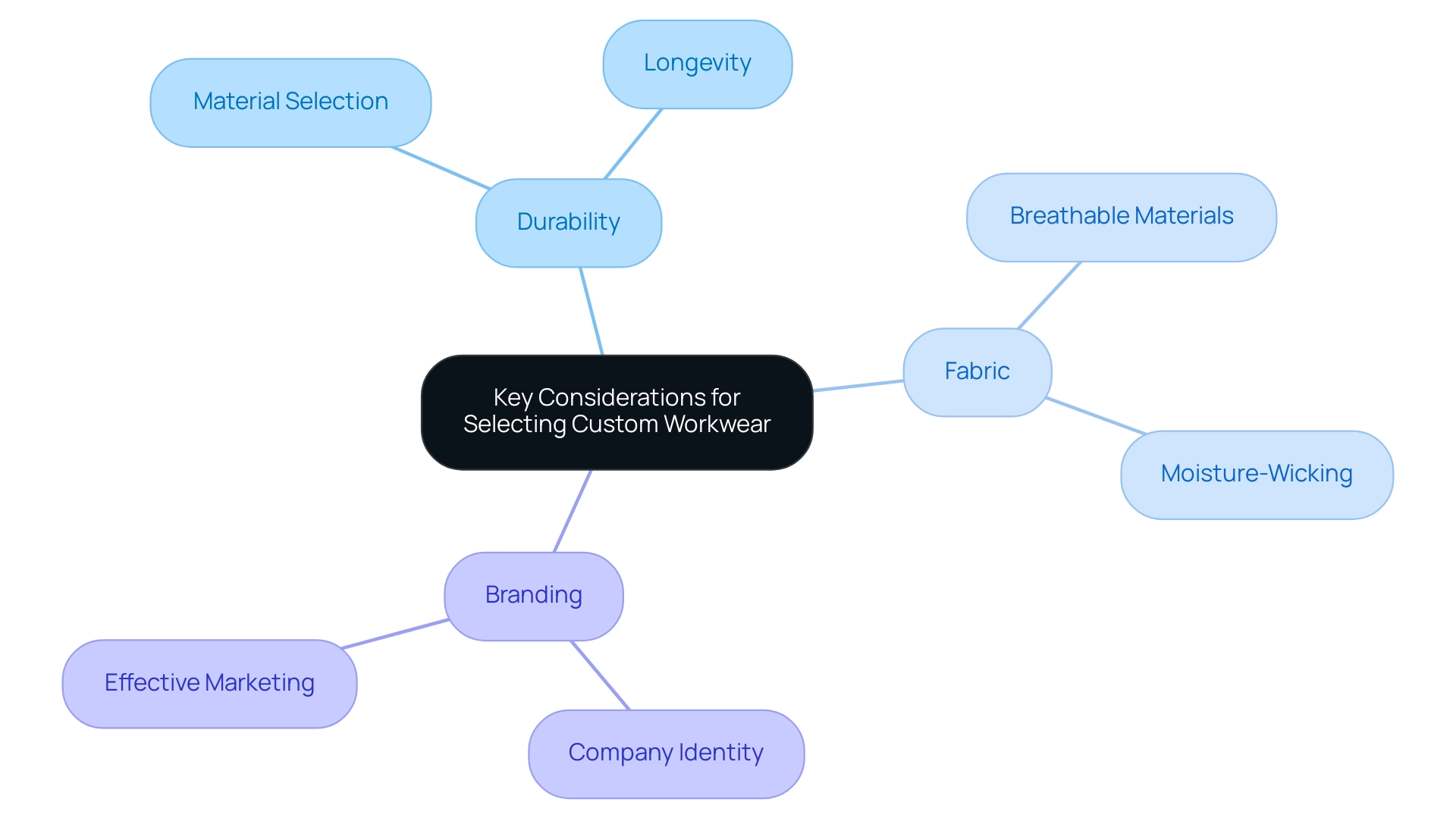
The Role of Customization in Enhancing Brand Identity
Custom workwear serves not only as a means of appearance but also as a dynamic branding tool that significantly elevates your company's identity. When staff don uniforms that embody the brand’s essence, it instills a profound sense of pride and belonging, which can lead to enhanced morale and stronger teamwork. In fact, organizations that recognize the importance of internal branding see notable benefits.
Gallup’s findings reveal that:
- 84% of highly engaged individuals felt recognized for their contributions.
- Only 25% of disengaged individuals reported similar experiences.
This disparity highlights the critical link between staff recognition and engagement in fostering a positive workplace culture. Furthermore, it is essential to note that 60% of staff who believe their employers don’t care about their well-being are likely to seek new jobs within the next year, underscoring the importance of support and morale.
Furthermore, consistent branding through custom workwear doesn’t just motivate your team; it also enhances recognition among customers, allowing your company’s values and mission to resonate more strongly in the marketplace. Effective internal communication is vital for staff engagement, and involving personnel in the design process of their clothing can enhance this communication. This method not only encourages a feeling of ownership but also guarantees consistency with the organization's vision, ultimately improving the overall effect of personalized attire on company identity.
As we transition into 2024, the significance of this strategy becomes even more pronounced, as statistics indicate that staff morale directly influences branding efforts. For instance, the case study titled "Flexibility as a Key Employee Support Factor" illustrates how organizations that offer flexibility and mental health support can better meet the evolving needs of their workforce. By prioritizing employee involvement in the design of custom workwear, you can create a workforce that embodies your brand and boosts its recognition.
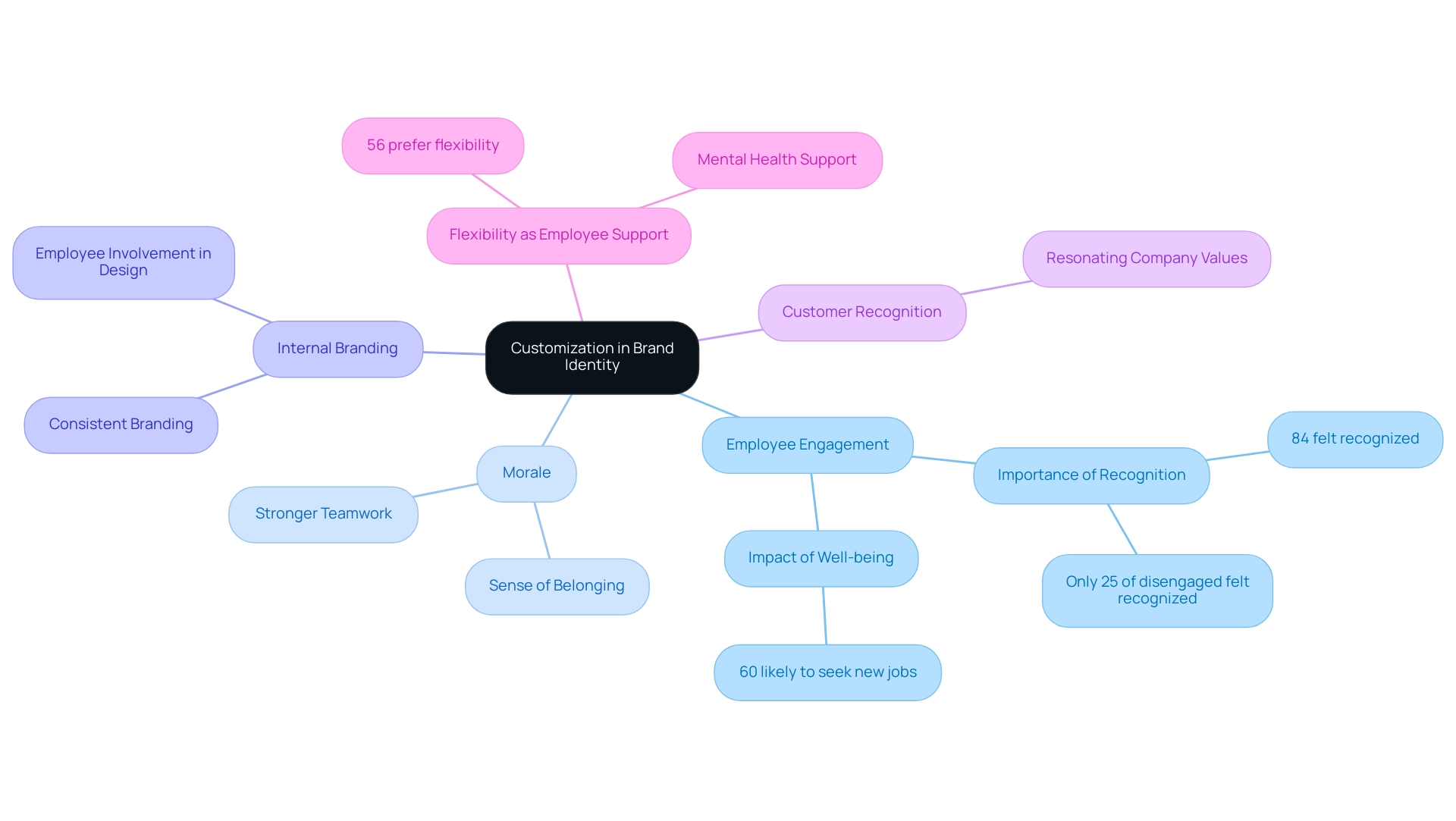
Ensuring Safety and Functionality in Custom Workwear
To guarantee safety and functionality in tailored clothing, several key considerations should guide your choices:
-
Safety Standards: Begin by confirming that your clothing complies with essential industry safety regulations. This includes ensuring features like flame resistance and high visibility requirements are met, which can be critical in high-risk sectors. As safety experts emphasize, compliance with established standards is not just a regulatory obligation—it's a commitment to the well-being of your workforce. The ISEA suggests that OSHA work with stakeholders to develop additional guidance to minimize any confusion about the requirement to provide properly fitting PPE. For instance, a recent case study highlighted that the use of helmets significantly reduces the risk of severe head injuries in hazardous environments like construction and mining.
-
Functionality: Practical features are essential for enhancing the daily user experience. Look for clothing that incorporates functional elements such as multiple pockets, ventilation systems, and adjustable components. If your team frequently operates outdoors, prioritize materials that offer weather resistance to keep them comfortable and safe in varying conditions. However, it's important to note that market supply issues have hindered access to properly fitting PPE, which can impact the functionality and effectiveness of the workwear.
-
Comfort: Never underestimate the importance of comfort in clothing design. When employees are comfortable, they can focus better on their tasks, leading to increased productivity. Consider testing various styles and fits to discover what works best for your team. A well-fitted outfit not only boosts morale but can also contribute to overall job satisfaction. As highlighted by industry experts, creating a supportive work environment is crucial, especially since 86% of US-based workers believe that companies should enhance mental health initiatives. A considerate approach to clothing for work can be a step in the right direction. Moreover, referencing the latest safety standards for tailored apparel in 2024 can further emphasize the necessity of compliance and its significance in today's market.
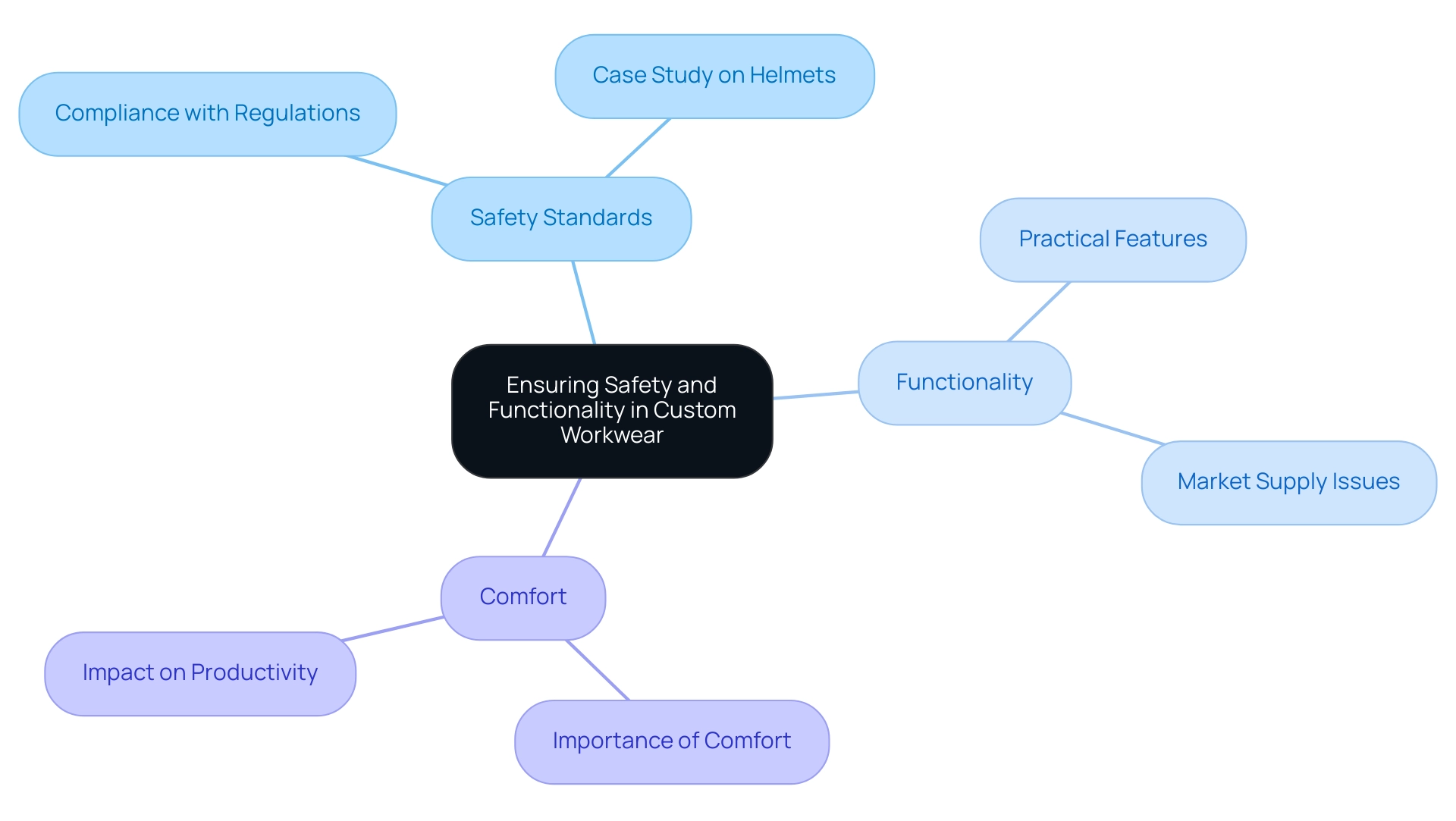
Sustainability in Custom Workwear: A Growing Priority
As sustainability increasingly takes center stage in consumer preferences, it is more crucial than ever to incorporate eco-friendly materials and practices into your custom workwear. Notably, approximately 60% of textile materials in use in the UK can be recycled, highlighting a wealth of sustainable options available in the market. It is essential to seek out suppliers who offer organic fabrics or recycled materials, as these choices not only reduce environmental impact but also resonate with a growing demographic of conscious consumers.
A striking 92% of customers express willingness to participate in clothing recycling programs supported by companies, underscoring the demand for sustainable practices in the industry. Furthermore, it is important to evaluate your entire supply chain to ensure that ethical practices are upheld, especially considering that only 9% of Australian consumers believe fashion companies are transparent about the ethics and sustainability of their products. By choosing sustainable solutions, you enhance your organization's reputation as a socially responsible entity, which can significantly boost customer loyalty and foster a positive perception.
As trends in custom workwear continue to evolve sustainably, aligning your offerings with these values positions your brand favorably in the market.
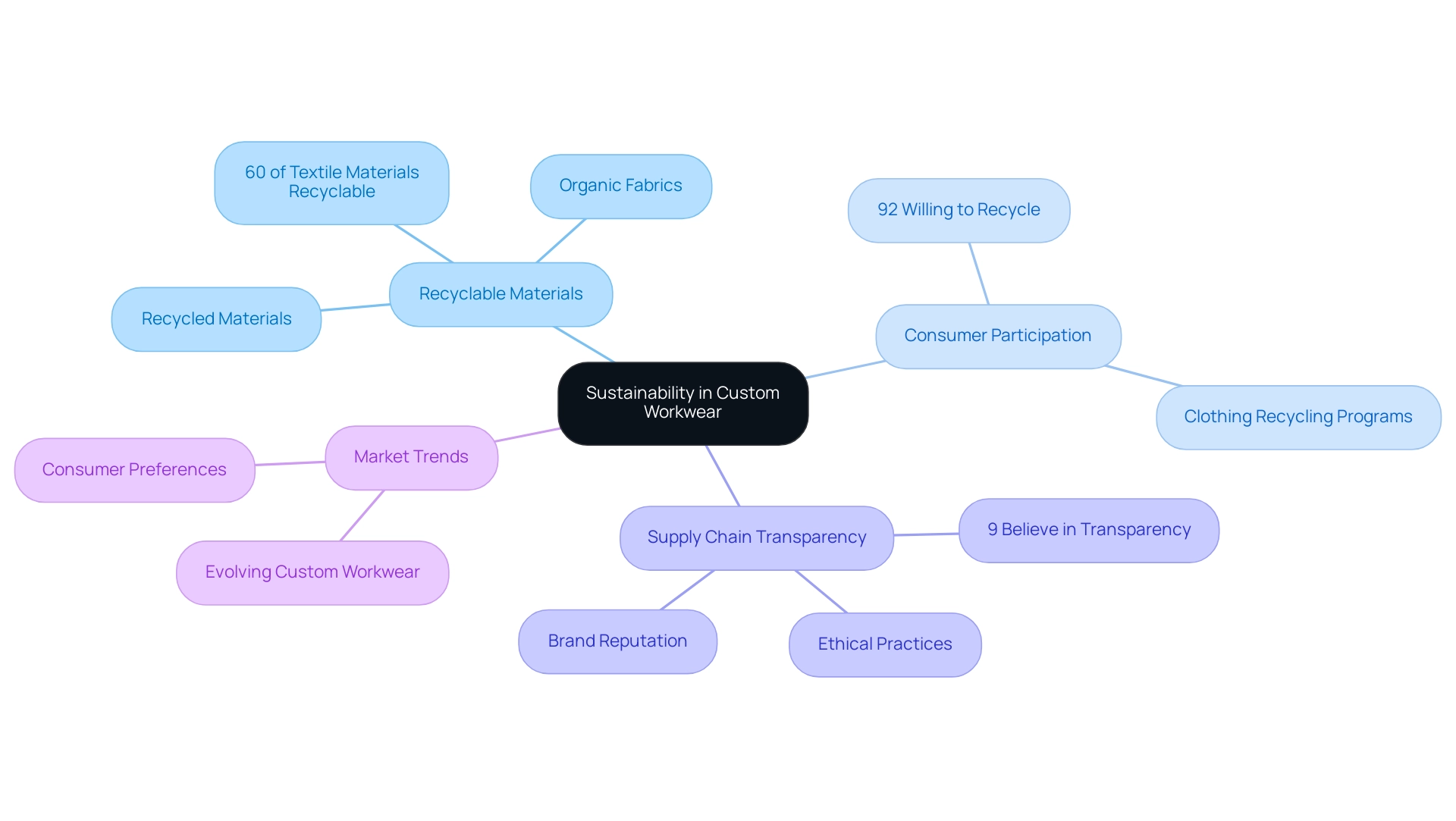
Conclusion
Choosing between custom workwear and off-the-shelf options is a pivotal decision that can greatly influence a company’s identity and employee engagement. Custom workwear not only enhances comfort and safety but also serves as a powerful branding tool, fostering a sense of belonging and pride among employees. By prioritizing the unique needs of the team and investing in tailored apparel, organizations can significantly boost morale and satisfaction, ultimately translating to improved productivity.
Key considerations such as durability, comfort, and effective branding play a crucial role in selecting the right custom workwear. When employees feel valued through personalized and functional apparel, it translates into higher engagement and retention rates. Moreover, integrating sustainability into workwear choices not only meets the growing consumer demand for eco-friendly practices but also strengthens brand loyalty and enhances the company’s reputation as a socially responsible entity.
In conclusion, the strategic choice of custom workwear goes beyond mere aesthetics; it is an essential investment in employee well-being and brand identity. Organizations that embrace this approach can create a positive workplace culture that resonates both internally and externally, paving the way for long-term success in a competitive market. As the landscape evolves, the emphasis on thoughtful workwear selection will only grow, making it vital for companies to stay ahead of the curve.




